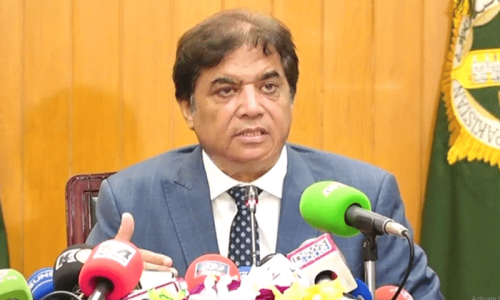KARACHI: The facilities, tools and budget required for the provision of education have steadily increased worldwide, including Pakistan, with improvement apparent in the country’s literacy rate also, but a decline is being observed in the students’ desire to learn, explore and seek knowledge for knowledge’s sake.
This was the key takeaway of a lecture, “The Problem of the Desire to Learn in University Education”, delivered by Dr Muhammad Moonis Azad, lecturer department of English, University of Karachi as part of 8th Faculty Discussion Group at the office of the dean Faculty of Arts and Social Sciences here on Tuesday.
The lecture, presided over by the faculty’s dean, Dr Shaista Tabassum and attended by faculty members of different departments of the university, explored various questions relating to the said problem based on what teachers and educators have observed.
According to Dr Azad, just like human beings have two aspects —body and soul—education, too, has two similar sides. Buildings, classrooms, exams, grades, fees, publications, etc, are some examples of the physical body of learning whereas curiosity, sense of wonder, love of ideas, desire to learn, character development are examples of the soul of education and learning.
He said the body seems to be growing ‘fat’ while the soul dying. Despite the advancement in technology, which had made things very easy for students and researchers, the desire of learning, which students used to have until a few years back, had decreased. They just wanted to get done with their assignments, exams, and tests and were little interested in exploring answers and spending time in studies, he added.
And that is something to which almost all the other teachers agreed as they shared similar experiences that the curiosity and desire for learning has gradually decreased and that most students are studying mainly to get degrees.
Discussing the causes of the decline in the soul of education or the desire to learn, he said the most common answers given for that problem were inflation, corruption and growing use of social media.
There is a growing tendency to give to ourselves (the teachers) and to students a pre-given conception of the world. The problems and their solutions are made readily apparent.
He believes that these are all wrong approaches towards learning. Quick and instant answers often do not allow one to think deeply about a question or a problem. And the latest is also not always right. There are seminal texts which are of timeless value, pondering over which can still provide one with answers to even the latest questions and problems.
“We need to discourage the culture of seeking quick and final answers, whether from teachers or from google,” he said.
Published in Dawn, July 31st, 2024











































